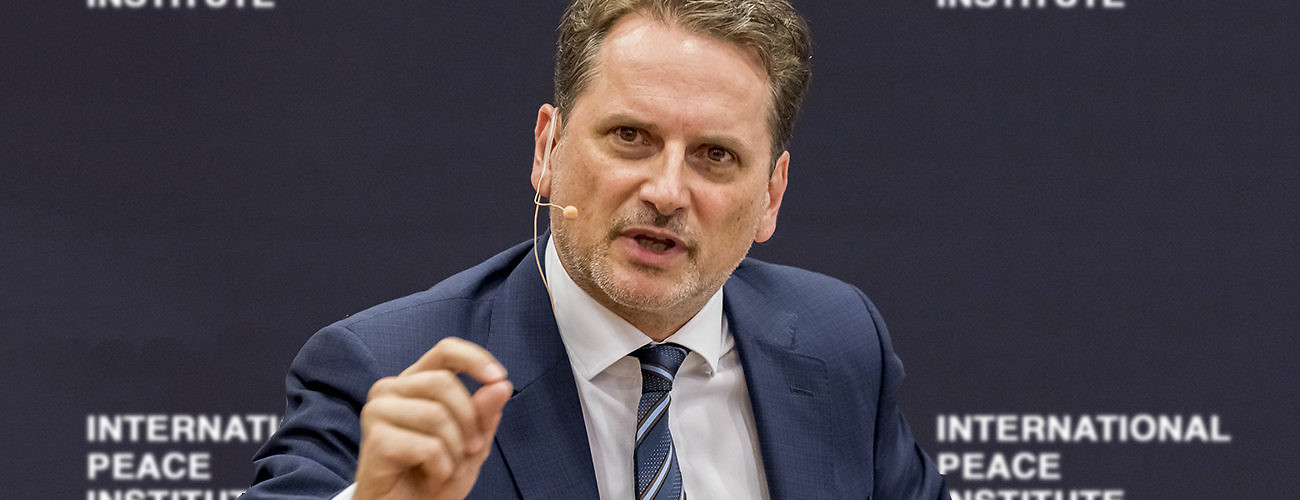The subject of the June 21st Speaker Series event at IPI was “The Risks of Politicizing Humanitarian Action: The UNRWA Perspective,” and the speaker, Pierre Krähenbühl, Commissioner-General of the United Nations Relief and Works Agency for Palestine Refugees in the Near East (UNRWA), focused his comments on what he said was the most misunderstood of all principles governing humanitarian work—neutrality.
“Neutrality is often misunderstood as ‘indifference’ when in fact it is a crucial action enabling principle,” he said. “It is crucial because what it means and entails is a fundamental consideration—you as an organization are not taking sides. The misunderstood part is that it sounds sometimes like neutrality is a reflex of taking a step back, physically moving away from the conflict or battlefield.” To the contrary, he said, “our humanitarian work is only possible if we engage… and this can be achieved only if we engage in dialogue with everyone.”
UNRWA provides education, health care, microfinance, and relief and social services to some 5 million Palestinian refugees in Jordan, Lebanon, Syria, the Gaza Strip, the West Bank, and East Jerusalem, an area that Mr. Krähenbühl identified as “one of the most polarized and politicized places on the planet.”
A former Director of Operations at The International Committee of the Red Cross with more than 25 years of experience in humanitarian, human rights, and development work, he pointed to a key misunderstanding about neutrality in conflict contexts. “Neutral does not mean, ‘I am not in favor of the other one, but I agree with you.’ It means, ‘I do not take sides. I am here in a conflict environment, and there is no need to take sides.’”
Maintaining a neutral position is always under challenge in the conflicted region where UNRWA operates, and he gave an example, stemming from the discovery that the fundamentalist organization Hamas had built a tunnel under one of the agency’s schools in Gaza. “We found out, we informed the different parties, and we condemned Hamas and contributed to the sealing the tunnels,” he said. “This is how far UNRWA is prepared to go to protect its neutrality, to not allow any actor in the region to play with its installations or undermine credibility of its work.”
UNRWA is holding its annual pledging conference starting June 25th, and a particular concern is how to make up for the cut last year in longstanding financial contributions to the agency from its traditionally most generous donor, the United States. He said that the agency had reduced its spending by $92 million and received increased funding from 42 countries and institutions in response to the American action, and its purpose now was to sustain that and keep the annual budget level at its current $1.2 billion. “If every single donor would preserve and maintain their level of contribution reached in 2018, we would be able to cover the financial needs of UNRWA,” he said.
He said the budget was balanced for the first half of 2019 but already was showing a deficit for June. A lack of funding would cripple the agency’s provision of services, especially in the fields of health and education, threatening to delay the opening of schools in August. He declared himself “passionate” about UNRWA’s education program and cited a comment about it from former British Prime Minister Gordon Brown—“There is not a single other actor in the humanitarian system that runs an entire education service of over one half million boys and girls.”
Mr. Krähenbühl said that providing education affected the stability of the entire region and alluded to a statement from King Abdullah II of Jordan. “The Jordanian King said that if the 122,000 boys and girls in the kingdom no longer had access to education, it would become a matter of national stability,” he said.
In a general assessment of the U.S. cuts, he said he didn’t challenge the right of a country to take such action, but he lamented what he called “the accompanying narrative that somehow that UNRWA is a key actor in perpetuating the refugeehood among Palestinians.” He added: “This analysis doesn’t stand serious review.”
Asked about the particular effect of the cutbacks on girls and women, he noted that there was gender parity in the parliament representing 280,000 students in Gaza. The president of the parliament, he said, was a 15-year old girl. “Every time we have funding challenges, we worry that it will impact young girls and women,” he said, “and this, in particular is something we are trying to limit.”
IPI Vice President Adam Lupel moderated the discussion.








